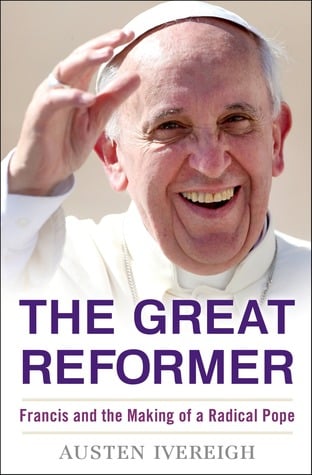For many, Pope Francis is still a puzzlement, to use the words of the song from that great musical The King and I. If you are among those puzzled, this is the book you’ve been waiting for.
The Great Reformer presents the man, the experiences that shaped him, and his responses to those experiences with a level of detail and perspective that will make it the definitive biography of Jorge Bergoglio before he became Pope Francis.
Buy The Great Reformer by Austen Ivereigh here
Austen Ivereigh, a well-known British Catholic journalist, does an excellent job in helping the reader understand the complicated history and contentious politics of Argentina, that very Latin American country so foreign to the American or English mind. He presents Pope Francis as a man on a mission to reform the Curia by making it more efficient in serving a growing Church in the 21st century. Ivereigh has much to say about Catholicism in South America, past and present, including its complicated relation with heads of state, most of whom were dictators ambivalent toward the Church and desirous of either coopting or countering Her influence. It was in this continental context of widespread poverty and corrupt government that the Marxist-based Liberation Theology arose and flourished in the 1960’s and 70’s, a theology Jorge Bergoglio rejected, but not without a degree of sympathy for those who felt its attractions in the desperate circumstances of the Catholic people they served. And because Pope Francis is the first Jesuit pope in history, there is much here about Bergoglio and the Society of Jesus, including his tenure as provincial superior of the Jesuits in Argentina during Argentina’s Dirty War, when the government’s military and death squads collaborated to wipe out left-wing guerrillas, and other government opponents found themselves caught in the middle, among them Jesuits outspokenly critical of the government’s repression of its leftist opponents, whom it imprisoned and tortured.
Buy The Great Reformer by Austen Ivereigh here
Ivereigh attributes the Pope’s perceived radicalism, which many of his critics mistakenly (in his biographer’s opinion) translate into secular political terms, to his willingness to return to the essentials of the Gospel. Francis’s preoccupation with the poor and marginalized, with those on the “peripheries,” is not Marxist, socialist, or even Western-style liberal so much as uncompromising Christianity, with an added dash of Latin American populism. Despite his powerful intellect, his politically attuned mind, and his theological sophistication, Pope Francis’s faith is primitive and undiluted: God is sovereign; the devil is active. Francis believes forthrightly in the power of prayer to act as a vehicle of God’s grace.
His relationship with the current president of Argentina, Cristina de Kirchner, during the time of his service as archbishop of Argentina, when he publicly opposed her views on gay marriage, abortion, and contraception, demonstrates the firmness and forthrightness of his orthodox beliefs. (Kirchner refused the archbishop’s many requests to meet with him to discuss the Church’s position on these and other topics.)
Ivereigh concludes with this illuminating anecdote:
“Listen up,” Francis told thousands of people in St. Peter’s Square on Pentecost; “listen up, if the Church is alive, it must always surprise,” then came the mischievous grin: “a church that does not have the capacity to surprise is a weak and sickened and dying Church. It should be taken to the recovery room at once.”
[The Great Reformer: Francis and the Making of a Radical Pope, by Austen Ivereigh New York: Henry Holt Company 379 pp., $30.00]
[Slideshow image credit: By Presidencia de la República Mexicana [CC BY 2.0], via Wikimedia Commons]

Leave a Reply